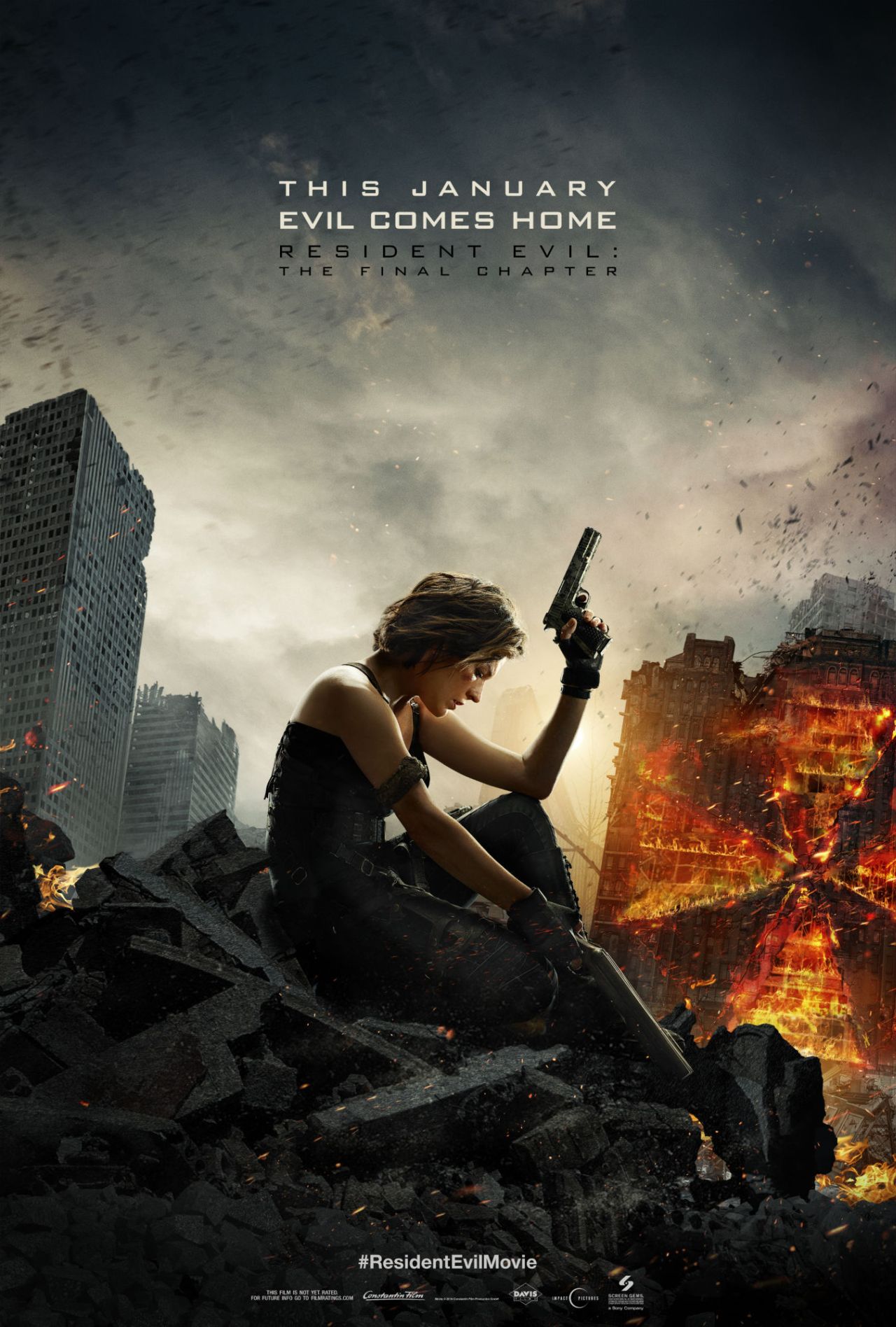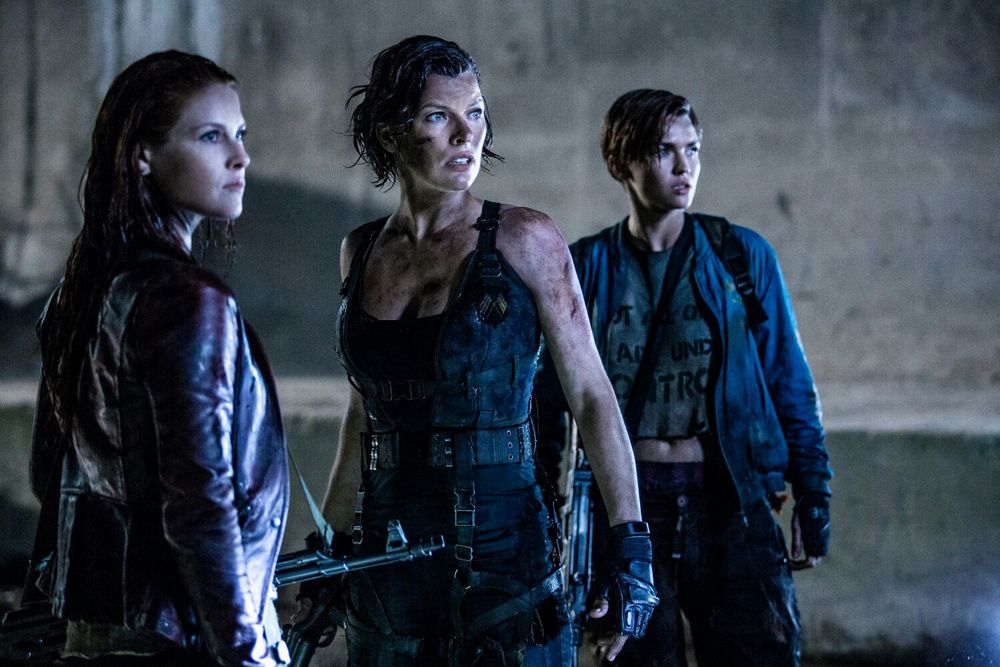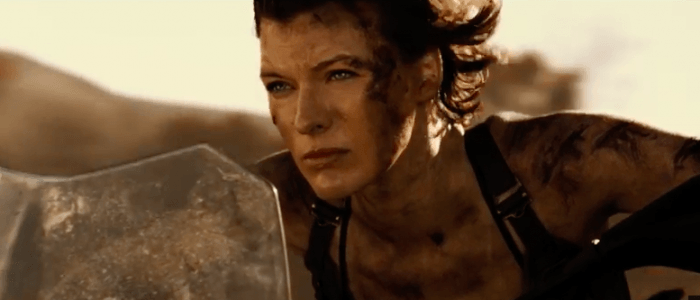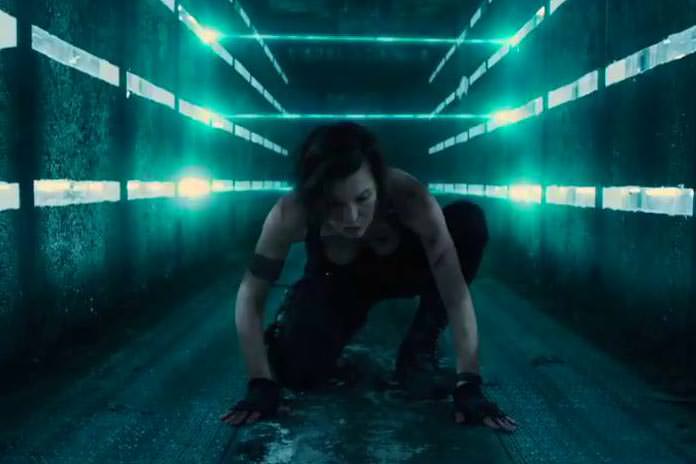RESIDENT EVIL: THE FINAL CHAPTER Review

Let’s talk vulgar auteurism. Arthouse content exudes an air of smug elitism that rarely thrives with average consumers. But what if commercially-aimed cinema were built to tap into the subconscious of the laymen in the audience? What if a director needs those people to listen to a message on consumerism, not the tuxedo-clad bourgeoisie at Cannes? Starting with RESIDENT EVIL: AFTERLIFE, director Paul W.S. Anderson confidently ushered in his derelict dystopia of false realities en lieu of an ever-expanding corporate network, be it the studio system or a higher political power. Coins are used as ammunition, truth and illusion become blurred via government-sanctioned simulation chambers, and guns are used just like cameras: “you point and shoot.” Where AFTERLIFE began a discourse on industrial celebrity, RETRIBUTION expanded the dialogue into the realm of video game identity as a cog in the corporate machine.
At the forefront of this is lead actress Milla Jovovich’s Alice, a character who we’ve come to accept as a non-entity of sorts, a beautiful, badass heroine with the stamina of Dominic Toretto. RETRIBUTION made it fundamentally clear that her identity was willfully out of place with the video games, powers and all. Alice was never meant to be integrated into RESIDENT EVIL, but she was shoehorned in, forcing her to partake in the adventure without any further prerogative. Surprisingly, that also became the core thesis of Anderson’s series. If AFTERLIFE dissected Alice as a hero-figure fighting against corporate America, and RETRIBUTION focused on the literal creation of the folk hero, then RESIDENT EVIL: THE FINAL CHAPTER became Anderson’s dissertation on the messianic by way of staunch religious fundamentalism.

The Holy Trinity
It ought to be noted that THE FINAL CHAPTER is Anderson’s most daring cinematic exposé yet. A last bastion of human survivors have taken refuge inside of a titanic silo-like structure. A mechanical gate with a spray-painted American flag protects the remnants of the American rebellion. Attacking them is an army of followers (read: zombies) that are directed to the building by a religious zealot. This fanatical partisan espouses that this apocalypse is the flood of our century, and he is the harbinger of light. Safely tucked inside his ark, the hypocrite chains his nonbelievers to the back of his tank, commanding his zombie army like the false prophet he is. Alice recognizes that the walls of her fortifications are no match for her corporate nemesis, resulting in a breaching of her floodgates. But as the true bringer of light (excellently framed by keeping her on the top floor, while the rest are on the ground), she pours gasoline down the silo, engulfing the blind horde in three waterfalls of fire.
The narrative follows this confessional thematic throughline throughout. Alice learns that the antagonistic Umbrella Corporation orchestrated the proverbial flood that wiped out seven-billion human lives. This declaration elegantly reframes the entire backstory of the contagion. The “accident” that destroyed the earth was not an act of God, not a mere case of bad luck, but a willful decision to save the lives of the top 1% before global warming, terrorism, overpopulation, and food shortages result in a far less containable outbreak. In doing so, THE FINAL CHAPTER also re-appropriates who in this narrative can be seen as the savior of mankind. Where Alice long appeared to be our ass-kicking heroine on the lam, Anderson reframes her as a victim of a global outbreak (and more).

Not all heroes wear capes, but they all go to the hairdresser
“I feel like I have been running my whole life,” claims Alice. It’s true; we know nothing of her life prior to the events in RESIDENT EVIL. She is no different from a blank video game protagonist. As Alice comes to understand this, she gains the strength to best her opponents. Set-pieces begin to have probabilities, returning to familiar locations makes them easier to complete, and accepting that one never had a life makes sacrificing it all the less difficult. But what’s all the more enticing is that THE FINAL CHAPTER allows this gaming heroine to ascend the ranks of a Biblical icon, a messiah for the flood of the 21st century. Cleansing the earth of its destructive virus, a battalion of zombies fall to their knees, carving out one of Anderson’s most indelible images: a nondescript crowd of worshipers have arrived at their final Mecca, a simulacra who was ready to die for them. In this act of humility, Alice is rewarded with the one thing a video game protagonist could never have had, the memories that were withheld from her all these years, expertly allowing THE FINAL CHAPTER to close Alice’s — surprisingly emotional — character arc.
With his 2017 installment, Anderson is at his most Michael Bay. CGI monsters are at their most refined (a far cry from the piracy-is-a-crime aesthetic and slapdash early-oughts renders of the first installment), and the editing is at a cocaine-induced rate, often relegating shots to little more than 10 to 15 frames in length. Admittedly, some of the stylish, refined care of RETRIBUTION feels absent here, and the absurdist opulence of AFTERLIFE is deeply missed, but what Anderson does so well is play with time. As cheap as a RESIDENT EVIL jumpscare may be, THE FINAL CHAPTER evolves its set pieces in completely unprecedented ways. And it’s all holistically integrated with the identity of Alice, a woman who comes to accept her virtues as a video game heroine despite never having been in the titular gaming series. It is through THE FINAL CHAPTER that Anderson makes his boldest claim yet. A folk hero is what the people make of it, and when making a film for commercial appeal, even a video game can become our next source of gospel. Religion is in the eye of the beholder.

I kept wondering why she doesn’t just lie down instead of bother with all the last-minute acrobatics
Between MORTAL KOMBAT and ALIEN VS. PREDATOR, Anderson has effectively detached himself from the “serious moviegoer” crowd indefinitely. As such, THE FINAL CHAPTER is somewhat of a carte blanche to tackle themes that need to be heard by casual viewers anyway. It’s a bizarre dichotomy that Anderson finds himself in, after all. Your average audience does not direct their attention to watching clinical documentaries a la ENRON: THE SMARTEST GUYS IN THE ROOM, nor does MARGIN CALL really catch their attention if REAL STEEL is currently in theatres (or Anderson’s widely underrated THE THREE MUSKETEERS; damn, October of 2011 was wild). In the same manner, one must hand it to Anderson for constructing such a thematically dense tapestry via a six-part genre picture. The flip-side of the argument is that I might be in the obnoxious, vocal minority that actually bothers to dissect what Anderson has wrought. But for what it’s worth, this is his most provocative, mature release yet.
Oh, and there’s a nice, albeit simplistic, tie-in to RESIDENT EVIL 7: BIOHAZARD, but like, whatever.
Verdict: Recommend



